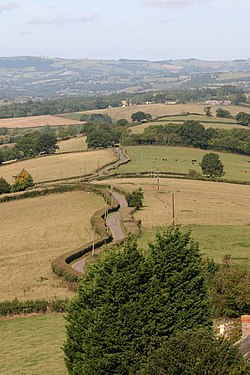Difference between revisions of "Cwmcarvan"
(Created page with '{{Infobox town |name=Cwmcarvan |welsh=Cwmcarfan |county=Monmouthshire |picture=Cwmcarvan.jpg |picture caption=Cwmcarvan fields from the church tower |os grid ref=SO476075 |latitu…') |
|||
| (2 intermediate revisions by the same user not shown) | |||
| Line 11: | Line 11: | ||
|postcode=NP25 | |postcode=NP25 | ||
|dialling code=01600 | |dialling code=01600 | ||
| − | |population= | + | |population=165 |
|LG district=Monmouthshire | |LG district=Monmouthshire | ||
|constituency=Monmouth | |constituency=Monmouth | ||
| − | }}'''Cwmcarvan''' is a small village in the depths of rural [[Monmouthshire]]. It is | + | }} |
| − | + | '''Cwmcarvan''' is a small village and ancient parish in the depths of rural [[Monmouthshire]]. It is four miles south-west of the [[county town]], [[Monmouth]] and about four miles east of [[Raglan, Monmouthshire|Raglan]], off the old A40 road not far from [[Trellech]]. | |
| − | + | ||
| − | + | ||
| − | + | ||
| + | ==Church of St Cadoc== | ||
| + | [[File:Cwmcarvan Church.jpg|left|thumb|200px|The church of St Cadoc]] | ||
| + | The church dates from the 13th or 14th century, in the Early English and Perpendicular styles, with some 16th-century features. It was heavily restored in the 1870s.<ref name=Newman>John Newman, ''The Buildings of Wales: Gwent/Monmouthshire'', 2000, ISBN 0-14-071053-1</ref> The dedication is to St Catwg or Cadoc, a Welsh saint of the 6th century. There are porches on both the south and north sides, supposedly so that the squires of Cwmbychan and Trevildu within the parish did not have to enter through the same door as each other.<ref name=bradney>Sir Joseph Bradney, ''A History of Monmouthshire, vol.2 part 2'', 1913</ref> | ||
| + | <br style="clear: left" /> | ||
==Nearby places== | ==Nearby places== | ||
===Craig-y-Dorth=== | ===Craig-y-Dorth=== | ||
{{main|Craig-y-Dorth}} | {{main|Craig-y-Dorth}} | ||
| − | The hill of Craig-y-Dorth, | + | The hill of Craig-y-Dorth, a mile north east of the church, was the site of a battle in 1404 between Owain Glyndŵr's rebels and those of the Crown. According to the ''Annals of Owain Glyn Dwr'', ''"Here the more part of the English were slain and they were chased up to the town gate'' [of Monmouth]".<ref>[http://www.deremilitari.org/resources/sources/owainglyndwr.htm Annals of Owain Glyn Dwr]</ref> |
===High Glanau=== | ===High Glanau=== | ||
Latest revision as of 22:44, 7 January 2016
| Cwmcarvan Welsh: Cwmcarfan | |
| Monmouthshire | |
|---|---|
 Cwmcarvan fields from the church tower | |
| Location | |
| Grid reference: | SO476075 |
| Location: | 51°45’49"N, 2°45’33"W |
| Data | |
| Population: | 165 |
| Post town: | Monmouth |
| Postcode: | NP25 |
| Dialling code: | 01600 |
| Local Government | |
| Council: | Monmouthshire |
| Parliamentary constituency: |
Monmouth |
Cwmcarvan is a small village and ancient parish in the depths of rural Monmouthshire. It is four miles south-west of the county town, Monmouth and about four miles east of Raglan, off the old A40 road not far from Trellech.
Contents
Church of St Cadoc
The church dates from the 13th or 14th century, in the Early English and Perpendicular styles, with some 16th-century features. It was heavily restored in the 1870s.[1] The dedication is to St Catwg or Cadoc, a Welsh saint of the 6th century. There are porches on both the south and north sides, supposedly so that the squires of Cwmbychan and Trevildu within the parish did not have to enter through the same door as each other.[2]
Nearby places
Craig-y-Dorth
- Main article: Craig-y-Dorth
The hill of Craig-y-Dorth, a mile north east of the church, was the site of a battle in 1404 between Owain Glyndŵr's rebels and those of the Crown. According to the Annals of Owain Glyn Dwr, "Here the more part of the English were slain and they were chased up to the town gate [of Monmouth]".[3]
High Glanau
The house at High Glanau was built in 1923 for the writer and garden designer Henry Avray Tipping.[1]
Outside links
References
- ↑ 1.0 1.1 John Newman, The Buildings of Wales: Gwent/Monmouthshire, 2000, ISBN 0-14-071053-1
- ↑ Sir Joseph Bradney, A History of Monmouthshire, vol.2 part 2, 1913
- ↑ Annals of Owain Glyn Dwr
